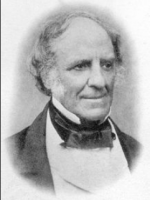










Neil Arnott (1788 – 1874) was a Scottish physician.
Neil Arnott was a distinguished graduate of Marischal College, University of Aberdeen and subsequently studied in London under Sir Everard Home (1756–1832), through whom he obtained, when only eighteen, the appointment of full surgeon to an East Indiaman. After making two voyages to China acting as a surgeon in the service of the British East India Company (1807-9 and 1810–11), he settled in London where he practised from 1811–1854, and quickly acquired a high reputation. He gave lectures at the Philomathic Institution published as Elements of physics (1827). He was one of the founders of the University of London, 1836. Within a few years he was made physician to the French and Spanish embassies, and in 1837 he became physician extraordinary to the Queen. He was elected to the Fellow of the Royal Society in 1838. He was a strong advocate of scientific, as opposed to purely classical, education; and he manifested interest in natural philosophy by the gift of 2,000 pounds to each of the four universities of Scotland and to the University of London, to promote its study in the experimental and practical form.
Inventions
From his earliest youth, Arnott had an intense love of natural philosophy, and to this added an inventiveness which served him in good stead in his profession and yielded the Arnott waterbed in 1832, which later was developed into a water-filled chair intended to prevent seasickness. Other inventions include the Arnott ventilator, the Arnott stove, etc.
Rumford Medal (1854)